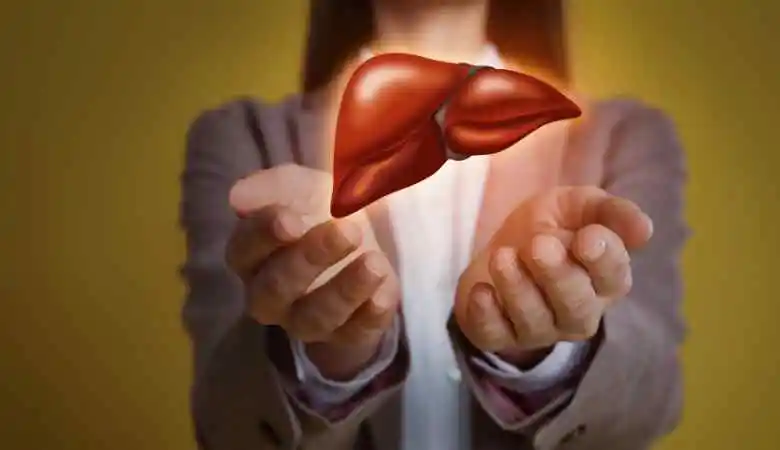An endocrinologist and gastroenterologist talked about how to maintain liver health.
What you need to know about liver function
The liver is the most important organ responsible for detoxifying the body. Everything that can be dangerous and harmful, be it toxins, poisons and allergens, is converted by the liver into less hazardous compounds and removed.
The same thing happens with excess substances, such as vitamins, and the liver gets rid of them. In addition to the function of a filter and cleaner, this organ has other critical tasks: storing energy reserves, regulating carbohydrate metabolism, producing glucose, synthesizing and storing vitamins, microelements and hormones.
In the liver, there is a depot of blood, which can be released into the general system during significant blood loss. The importance of the liver and its health cannot be overestimated.
6 foods that are good for your liver
Nutrition plays a key role in maintaining liver health. Many foods contain substances that help normalize liver enzyme levels, protect against fat accumulation, and reduce inflammation. According to the latest data, such products include black coffee, green tea, grapefruit, berries (cranberries and blueberries), grapes (antioxidant resveratrol), prickly pear, beet juice, cruciferous vegetables (Brussels sprouts, cauliflower, broccoli), nuts, fatty fish, olive oil. In fact, all these products are part of the Mediterranean diet.
1. Coffee
It is usually criticized for its potentially harmful effect on the cardiovascular system and stimulation of excessive excitability. Still, coffee has a positive impact on the liver. Moreover, research shows that regular consumption of coffee, both caffeinated and decaffeinated, may reduce the risk of liver cancer. Doctors warn that limiting yourself to three to four cups per day is better.
2. Tea
This tonic drink is recommended to be consumed to cheer up. It may also help the liver. Multiple studies have shown that tea, especially green tea, reduces liver enzyme levels in nonalcoholic fatty liver disease (NAFLD). The risks of developing liver cancer are also lower if you drink tea regularly. True, there should be a lot of drinks in the daily diet – from five cups a day
3. Cranberries and blueberries
These berries contain antioxidants anthocyanins, which have a beneficial effect on the liver. One study supplemented a control group with cranberry powder and found positive results on lipid profiles, insulin resistance, and hepatic steatosis in patients with NAFLD.
4. Nuts
Nuts contain a lot of valuable substances – these include healthy fats, antioxidants, and vitamin E. Thanks to this, a diet rich in nuts helps in the fight against NAFLD, while a diet low in nuts increases the risk of developing this disease.
5. Oily fish
Fatty fish contain omega-3 fatty acids, which are suitable for the heart and the liver. In particular, they help reduce liver fat and triglycerides in patients with NAFLD or nonalcoholic steatohepatitis.
However, it would help if you were careful with fats. Other studies (though only in animals so far) have shown that too high a ratio of omega-6 to omega-3 may contribute to the development of liver disease. Omega-6s most often enter the body from vegetable oils and butter. It is better to alternate fats rather than consume a lot of them at once.
6. Olive oil
Vegetable oils themselves are beneficial. For example, olive oil is the basis of the Mediterranean diet. Research shows that it helps prevent liver disease. Extra virgin olive oil protects it from inflammation, oxidative stress, insulin resistance, and other diseases.
Foods harmful to the liver
The liver is susceptible to everything we consume since it neutralizes the harm of foods. The less we eat and drink harmful foods, the lower the load on this organ.
To maintain liver health, it is essential to monitor your diet, drink enough fluids, limit your consumption of alcohol, fast food, excessive amounts of unnecessary dietary supplements and other additives, and not abuse trans fats and sugar.”
- Fast food: Dishes often contain harmful trans fats, large amounts of sugar and fast carbohydrates.
- Alcohol: Excessive alcohol consumption causes fatty liver disease, hepatitis and even cirrhosis.
- Sugar: Limiting your intake of foods high in added sugar helps prevent fat from accumulating in the liver. Sweeteners also have a negative effect.
Suppose you already have problems with the liver, or there has been a period of abuse of foods harmful to the liver. In that case,. In that case, it makes sense to pay attention to diet No. 5, according to Pevzner. It is explicitly designed to reduce the load on the liver.
How to support liver health: 7 tips
Maintaining a healthy liver is part of a healthy lifestyle. He can, with a certain degree of probability, guarantee that the liver will cope with its most essential functions.
The doctor recommends the following rules for maintaining liver health:
- Refusal of high-calorie fatty foods
- Moderation in alcohol consumption
- Control of weight, blood sugar and cholesterol levels
- Drinking regimen: at least 1.5 litres of clean water per day
- Physical activity
- Taking medications only as prescribed by a doctor and under his supervision
- Hepatitis B vaccination
These simple rules will help prevent hepatocyte damage and restore their functions after illness.


